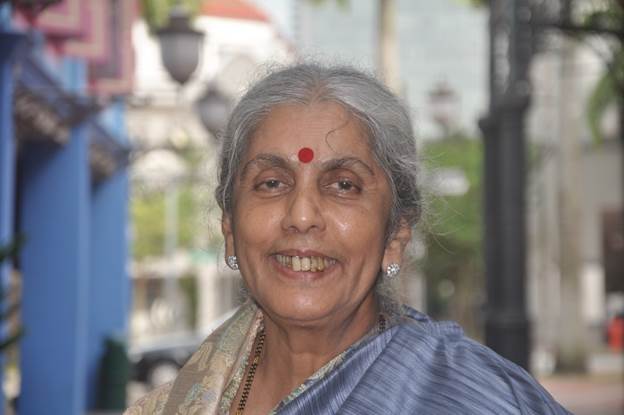
Some people are trying to Make in India. Some are talking about the business that it will bring. Some others about the innovation it will foster. Most of these talks are in future tense. But a few are working in the present, busy spreading globally a love for what is made in India. Meet one person who has been doing it, and doing it for long.
“The place of music is in your heart. In your soul. But where is it today? It’s on a piece of paper with notations. From heart it has moved to paper. From guru it is moving to internet. Music is not just about learning notes, it is about feeling them, nurturing them.” She takes a deep breath, “Times are different now, one wants to dabble in a lot of things in limited hours. Earlier one would pick one thing and go deep into it... nevertheless, when I pray, I pray for happiness for all, and pray that music remains in our heart and soul”. She smiles a wide smile that reaches her eyes, and above, almost touching the big round red bindi in the middle of her eyebrows.
Spend some time with Mrs. Kalyani Puranik, the Hindustani classical music guru at Temple of Fine Arts, Singapore, and you begin to understand what dedication means. Dressed in a cotton sari she sits in her classroom with a synthesizer in front of her, musical instruments on either side and a small handcrafted temple on her right. Idols of Krishna, Shiv, Ganesh, Saraswati and many more sit in the temple. On the wall are small pictures of Swami Shantanand Saraswati (the founder of Temple of Fine Arts) and his guru Swami Sivananda. In between our conversation she often turns to the pictures, sometimes even looking at them to find the exact words she wants.
Born in 1949 into a family that breathed music in Mumbai, Ms. Puranik’s earliest childhood memories are of waking up at four in the morning along with her siblings to make tea for her guru- her father, and then sitting down for vocal training. As a daughter of Pandit Balakrishnabuwa Kapileshwari, chief disciple and biographer of Ustaad Abdul Karim Khan, (the pivotal founder of Kirana Gharana) the three-hour daily musical training was only natural. After three hours of polishing her vocal notes, she and her siblings would leave for school. Music came naturally to her but Mrs. Puranik says it wasn’t music that she wanted to pursue. Law attracted her. But that was not to be.
She was twenty when she met Swami Chinmayananad at a performance. She smiles as she narrates the episode, “I sang Raag Todi that day and remember that Swami Chinmayananad sat with his eyes closed through out the performance. After the performance he called me and offered me my first job as Principal, Chinmaya Kala Kendra, a school of performing arts in Mumbai. How could I say no to a guru?”
“My parents didn’t allow me to perform outside Mumbai, performing abroad was out of question.” Marriage changed that. “Atul, a businessman by profession, has been very supportive from the beginning. He is also deeply religious and spiritually inclined like me.”
Mrs. Puranik travelled around the globe performing and promoting Indian culture through music. She first performed in Singapore in 1982. “When I came again in 1988, Swami Shantanand suggested that I concentrate on teaching abroad. He
asked me to join Kala Mandhir in Singapore (later known as Temple of Fine Arts). How could I go against his wishes? That year we held a memorable two and a half hour concert at Victoria Hall that brought the north (Hindustani) and south Indian (Karnatic) classical music together. It was Swami ji’s idea and the audience loved it.”
Mrs. Puranik’s students at the Temple Of Fine Arts range from six to sixty and she is fondly called ‘didi’ (elder sister in Hindi). Krsna Lila Dasa Tan Thiam Teck, a Singaporean born Chinese was one of her first students here. Among the senior most sitar and sarod players of Singapore now, he says, “In Chinese we say, Gǎnxiè ài, gǎnxiè nǐ, which means, gratitude to love, gratitude to you. She comes from a very rich musical heritage, but she doesn’t flaunt it. Her life is all about music.” Chandrashekharan, now a freelance tabla teacher, had initially come to her wanting to learn sitar. “At that time didi was teaching sitar, harmonium, tabla, vocals just about everything in Hindustani classical. I had some background in tabla too. Didi was planning an ensemble with 30-40 sitar players. When I asked her if my tabla knowledge could be helpful, she sat me with the tabla. From that day I became her tabla player and continue to be.“
“I had never thought I would teach music. God has helped me in the journey. My background in research alongside my father helped. Looking after the music section of Mahila Vikas Mandal, Mumbai for the last 44 years and as Secretary of the Khan Saheb Abdul Karim Khan Sangeet Prachar Mandal (while being based in Singapore) have also been a learning experience.” As a young girl, Mrs. Puranik assisted her father’s research work for the award winning books ‘Shruti Darshan’ on music and ‘Swara Prakash’ on notation. The research took her to places like National Research Laboratory (Acoustic Department), Sangeet Academy, Physics Department of the University of Pune and encouraged her inquisitive mind. She followed this with her own work on western notation of Hindustani classical music.
Two years ago, the school established by her father’s guru in Mumbai, Sri Saraswati Sangeet Vidyalaya, completed 100 years. Students from around the world got together to pay a musical tribute in Mumbai.
“Music brings people together. It is a blessing to be able to do that.”
We cannot agree more.